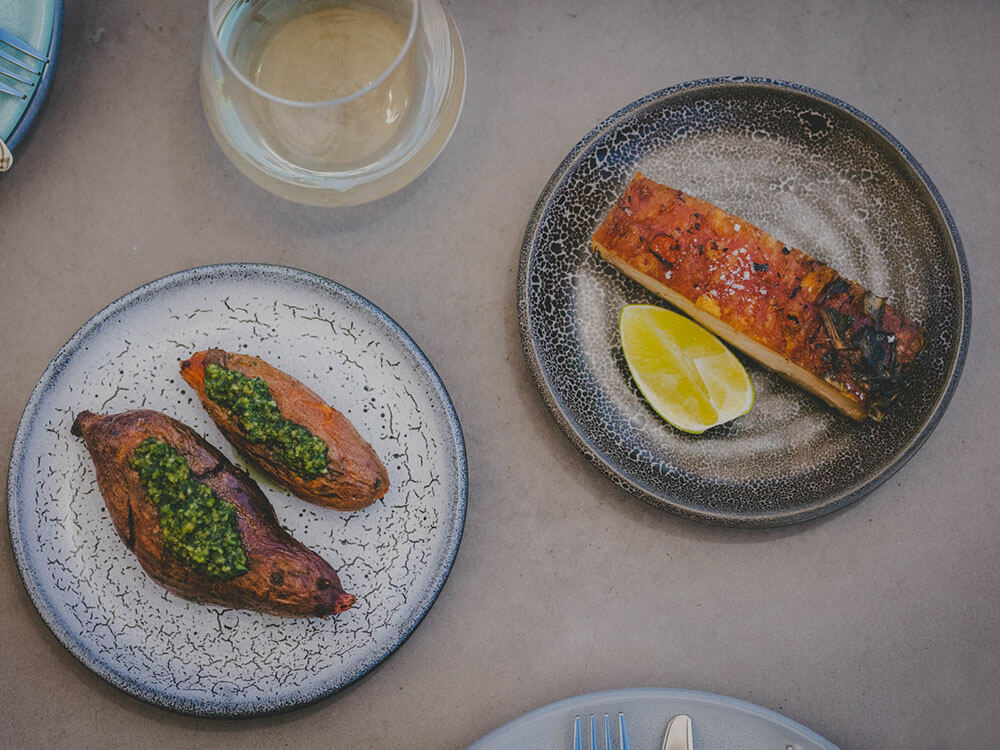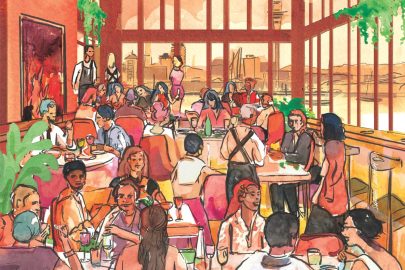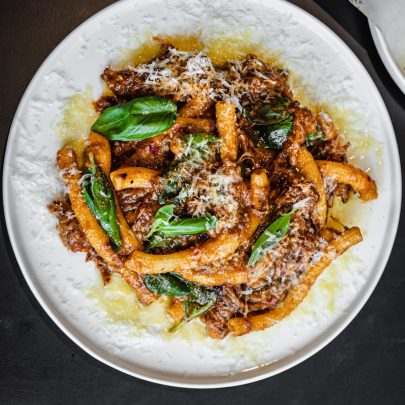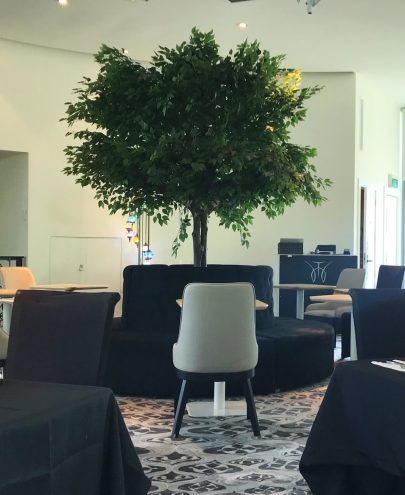Apr 13, 2021 Restaurants
I can remember what I was wearing the first time I made my way down Marylebone High Street, bracing against the British winter until I found the glass bay windows of Peter Gordon’s The Providores and Tapa Room. On a busy day, to push through the door from the whistling cold into the sound of so many happy people cracked through me like a mood swing. It was a London institution like no other.
There’s a special difficulty in making a name for yourself and your country in a place so far away from home. Like Ben Shewry of Melbourne’s Attica — New Zealand’s other most internationally famous chef — Gordon wasn’t “made” in New Zealand. He started here but England made him. His ability to go from a Ngāti Kahungunu and Ngāi Tahu kid from Whanganui to a household name in England is nothing short of Herculean. He was deeply woven into the British culinary tapestry, making the 2019 closure of The Providores and Tapa Room palpable in London. He did, however, always fly the flag (and wear the pounamu) — an unofficial ambassador who took it upon himself to familiarise the United Kingdom with the unique wines and produce of New Zealand, a place so much more than a small faraway island nation.
After pressing the detonator on the past 25 years of his life in England and severing ties with SkyCity’s The Sugar Club, Gordon has returned home to start again at age 57. With Homeland , he has taken the role of New Zealand culinary ambassador a step further. Dubbed a “Food Embassy for Aotearoa”, Homeland is a hub for producers, a cooking school, and an all-day restaurant. It’s an ambitious project and the largest restaurant he’s ever run.
With the bones of such a huge open space and the floor-to- ceiling glass, you run the risk of having the energy bleed out of the room like a severed jugular. But he and partner Alastair Carruthers, who have opened Homeland independently from any investors, have done an admirable job of avoiding cold and keeping the space inviting and pleasantly airy.
It’s a good thing, as there’s a lot going on here. There’s a shop where you can stock up on artisanal salt from Northland’s Taipa Salt Pig or organic honey from Niue’s flourishing Pacific Bee Sanctuary. You can take a cooking class on the modern roast or bring in your catch and have Gordon teach you how to transform it into a fragrant, whole curried fish. You can pop in for a pastry from the counter or settle into the garden for a late lunch. With the newest addition of Sunday Jive Sessions for those after live music, there are no shortage of ways in which you can experience Homeland.
It’s on my third visit when I decide my ideal experience of Homeland is to sit in the garden next to the pineapple sage and the chocolate mint in the middle of the day, a table scattered with an order that balances Gordon’s brunchy dishes with bright vegetables and salads and, if appetite allows, a plate of clams or fish. Then throw in a vanilla-and-orange-infused cold brew or a glass of wine from Homeland’s exclusively New Zealand list for something stronger. Perhaps Carruthers is teaching one of the young chefs how to properly harvest from the mint planter (cut the edges so it grows more in the middle) or Gordon’s setting up for his bread-making course, easily spied in his element through glass. It all adds to the sense of community and a lovely afternoon dining by the water.
It’s not surprising that many of the most satisfying dishes on the menu at Homeland fall into the brunch category. Over 18 years of warm cheese scones and plates of chorizo at The Providores and Tapa Room, Gordon helped to successfully transform the English into a people who brunched. At Homeland, his classic Turkish-eggs dish makes its due appearance on the menu and it still satisfies: two eggs in a bowl of whipped garlicky yoghurt topped with a copper halo of Aleppo-infused chilli butter and fresh herbs from the garden. It’s a dish that, when dug into with a tear of crusty Dusty Apron sourdough, brings with it that special joy that can only come from a perfectly jammy yolk. It’s a signature that’s stood the test of time and exactly the sort of cooking that solidified Gordon as the Godfather of Fusion .
Fusion is a funny beast. It’s a style of cuisine that can call to mind things like miso caramel and was once a sort of culinary “dirty word”. It also happens to be one of the more impactful cooking styles of the past century. It was ridiculed as “Con- Fusion” by many critics in the beginning, but fusion chefs pushed diners to think about cuisine outside the confines of rigid categories. They helped them to understand how cuisine can be shaped by a meeting of different cultures and life experiences to create dishes as multifaceted as the people behind the plates. Essentially, fusion cuisine helped make it so that you can walk into a trendy bistro anywhere in the world, eat a meal composed of flavours from France, Israel and South America, and be content with the explanation that the chef is cooking “their food”.
At this point, I imagine Gordon must feel like Joaquim de Almeida, one of Hollywood’s most recognisable bad guys (you’ll know his face): unable to be cast in any role that does not include a vendetta and a weapon in the same way Gordon cannot be spoken about without being painted with the fusion brush that brought him his initial fame. “If I’d simply been able to say I was cooking ‘my food’ and gotten away with it, I would have done that,” Gordon tells me following my last visit to Homeland. “These days, there is such a mash-up of cuisines that perhaps fusion has become redundant and has served its purpose.”
If fusion has indeed served its purpose and become redundant, Gordon’s food has not. At Homeland, the bam-bam-bam layering of flavour and texture smacks that Gordon has worked with over the years is still there, but pared back and noticeably subtle across the menu. You won’t find dishes built big with punchy hits of garlic labneh paired with crispy star anise praline, or spikes of sesame miso alongside rich date molasses, but you will find that the ingredients speak nicely for themselves when lightly adorned. It’s Peter Gordon, just done a bit softer. The acoustic album, if you will. It’s an approach that feels purposeful when the mission is to showcase voices of Aotearoa’s producers and produce. Too many notes in fortissimo might drown them out.
Instead, there is hot-smoked Ōra King Salmon that gets barely tempered with a creamy horseradish, ginger dressing and pearls of tangerine salmon roe. Mānuka-smoked fish roe toast layers a slather of creamy roe with chunks of whole roe sacks, chilli and ginger, and fried curry leaves that are crisp to the point of translucence. It’s gutsy and, if you enjoy fish roe, is a must.
Dishes skew bright, light and, in the best way, quite simple.
Clams from Cloudy Bay swim in a hot amber pool of coconut- ginger broth that’s been deepened with miso and finished with a generous fist of fresh coriander. The quinoa at the bottom of the bowl manages to leave you happy enough to trade the typical bread mop for soupy spoonfuls of the locally sourced grain once you’re left with nothing but empty shells.
A take on the staple watermelon-and-feta salad that’s followed Gordon in different iterations throughout his career appears with the welcome addition of colourful chunks of tomato and a showering of house-made chilli gunpowder. The mix, a vibrant blend of curry leaves, several varieties of chilli, and a thoughtful zap of tamarind, is courtesy of head chef Nagaraju Sunkara, who has followed Gordon after 10 years working with him at SkyCity.
Well-executed simplicity is the name of the game here, but where the simplicity doesn’t feel as purposeful, we hit snags. Take the paneer. While the MooDew paneer itself is lovely in flavour and texture, it runs slightly too honey-sweet and needs a heavier hand of dukkah for texture, especially, when wedged between a very ordinary pile of rocket and slices of cherry tomatoes.
My other minor grievance with the menu would be the hearty chunk of braised beef cheek and potato purée cloaked in chimichurri. Although delicious, a wintery braise feels seasonally out of whack when watching yachts bob along the horizon in 30-degree heat. That said, I would happily welcome it in the colder months.
If there was one thing I would put to Homeland to remedy above all else, it would be to fine-tune service. While Julie Woodyear-Smith and host Kylee McShane are two of the most genuinely warm and inviting front-of-house folk I have had the pleasure of coming across in Auckland, service can be a bit sluggish and inconsistent. On one visit, our server happily bounds to the kitchen and back to check if a dish’s acidity is coming from sumac. One another, we vie for their attention with a near-empty room.
Homeland is important for Auckland. Restaurants and chefs are often the first point in changing foodways in a community, and Homeland is uniquely set up to do this. Think of the short rib and its journey from being an often-discarded cheap cut of meat to an on-trend restaurant staple before finally landing in the lexicon of the average home cook. It’s also the sort of place that diners can come to rely on for well-executed fresh fare any time of the day and into the evening. While not exactly an Amano , it’s similar in the sense that it’s the sort of place diners can go when they’re craving simple certainty that won’t disappoint. Is there anything better for the makings of an institution than delicious reliability?
It’s a use I don’t think Auckland has fully figured out yet, as on my past three visits, the number of diners has been quite up and down and not what I would expect for what this restaurant is delivering. Whether it’s the not-quite-there-just-yet-ness of the neighbourhood or the sea of other younger and arguably flasher openings the city has just gone through, I’m not sure. Regardless, it would be a pity for Auckland not to take proper advantage of Homeland this way, in what is clearly England’s loss.
At Metro, we decided to relaunch our restaurant reviews with stars. No half stars, as we wanted to sway diners to dive into the writing and rely on the nuances of the review to make their decisions. On a scale where five is defined as being able to stand alongside the absolute best restaurants in the world (think Noma, Hiša Franko and Eleven Madison Park), most good eateries will earn a perfectly respectable and visit-worthy two or three stars. So, while Auckland gets accustomed to the values of our new scale, let me help with some perspective: It’s a strange and lucky job to be able to dine out for work and have other people pay for it. One of the implications, though, is that unless you are anonymous, it undeniably skews how you’re treated and impacts on the experience to some degree. But it also gives you a barometer that all food writers use, for better or for worse, when discussing restaurants among ourselves: Would I come back and spend my own money here?
Yes. Over and over and over.
Homeland
![]()
11 Westhaven Dr, central city
Hours: Wednesday 8am-3pm; Thursday-Sunday 8am-3pm, 3.30-9pm
DINNER BILL: Mains $17-$36; sides $3-$14; dessert $17-$26
What does getting three stars mean?
This review was published in our Autumn 2021 issue, which was released in March 2021.






